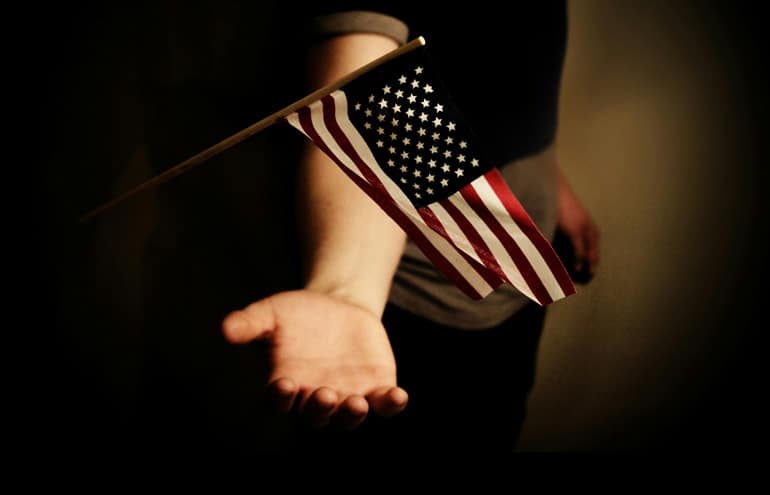While Biglaw’s response to executive orders is at the center of the storm, this is a crossroads moment for everyone in the legal profession. Silence or passive compliance sends a message. So does courageous, principled resistance. Here are steps you can take to speak up and push back.

Table of contents
- The Ethical Quagmire: A Threat to Legal Integrity
- Biglaw’s Responsibility: Prestige vs. Principle
- Emerging Resistance
- The Role of Solo and Small Firm Lawyers
- Speaking Up from the Grassroots
- Supporting the Bar’s Collective Action
- Mentoring and Moral Leadership
- How Lawyers Can Speak Up and Push Back
- The Legal Profession at a Crossroads
President Donald Trump issued a series of executive orders in March 2025 targeting major law firms. These orders penalized certain firms that had opposed Trump and/or his administration’s interests. In response to the threat of these executive orders, many law firms negotiated deals with the administration to avoid the punitive measures. For example, Skadden, Arps, Slate, Meagher & Flom LLP proactively engaged with the Trump administration to reach a settlement. On March 28, the firm agreed to provide $100 million in pro bono legal services to causes supported by the administration. Additionally, Skadden committed to ceasing any diversity, equity and inclusion (DEI) hiring practices that could be perceived as discriminatory.
Other Biglaw firms reached similar deals, resulting in an overall pledge of almost $1 billion in pro bono work to support causes promoted by the administration.
Other firms did not cooperate, however, and instead elected to fight back. Perkins Coie is one of those firms. Trump’s Executive Order 14230, titled “Addressing Risks from Perkins Coie LLP,” imposed several punitive measures against the law firm. The order suspended security clearances for all firm employees, prohibited them from entering federal buildings, and mandated the termination of any federal contracts involving Perkins Coie. Additionally, it directed a review of the firm’s DEI practices, alleging racial discrimination in hiring and promotion policies. Perkins Coie filed a lawsuit challenging the executive order, arguing that it violated constitutional rights such as freedom of speech, due process and the right to legal representation.
On March 12, U.S. District Judge Beryl Howell issued a temporary restraining order blocking key provisions of the executive order, including the suspension of security clearances and restrictions on federal building access. Over 500 law firms signed an amicus brief supporting Perkins Coie in the ongoing litigation.
These executive orders have sparked widespread alarm. The American Bar Association has issued a strong statement denouncing the developments, and 50 state and local bar associations have joined in support.
At the heart of this growing dissent is a concern that core legal values — independence, impartiality and commitment to the rule of law — are at risk.
The Ethical Quagmire: A Threat to Legal Integrity
The legal profession holds a unique role in safeguarding democratic principles. Lawyers are not only advocates for their clients but also officers of the court with a duty to uphold justice. Independence is essential for justice. When lawyers bow to outside pressures like those being exerted by the current administration, the rule of law is weakened. Clients and the public lose faith in the system. When lawyers fear retribution for representing unpopular clients or fear punishment for pursuing claims against the government for abuse of power, it puts our justice system in great peril.
In the case of negotiated deals for pro bono representation, the issue is not merely who receives pro bono representation but whether the legal profession is being co-opted for political gain. In a climate where fear of retribution or desire for influence might distort professional judgment, the independence of legal counsel becomes more vital than ever.
Biglaw’s Responsibility: Prestige vs. Principle
Biglaw firms possess enormous influence over the legal industry, public perception of the legal profession, and political discourse. With that power comes responsibility. By appearing to endorse or legitimize executive actions that many legal scholars deem undemocratic, these firms risk more than reputational damage. They threaten to erode public trust in the legal system itself.
This is a moment for leadership. Silence or passive compliance sends a message. So does courageous, principled resistance.
Emerging Resistance
While some firms have complied with the administration’s demands, others are pushing back publicly and in court.
- As noted above, Perkins Coie has filed a lawsuit challenging the administration’s executive order.
- WilmerHale filed a lawsuit on March 28, 2025, challenging an executive order that targeted the firm. The executive order, titled “Addressing Risks from WilmerHale,” directed federal agencies to suspend security clearances of WilmerHale attorneys, restrict their access to federal buildings, and discourage federal officials from engaging with or hiring the firm. The order cited WilmerHale’s past employment of Robert Mueller, the former special counsel who investigated Trump during his first term, as evidence that the firm was employing lawyers who “weaponize the prosecutorial power to upend the democratic process and distort justice.”
- On March 25, 2025, Trump issued Executive Order 14246 against Jenner & Block, citing the firm’s employment of Andrew Weissmann, a former prosecutor involved in the Mueller investigation. The order limited the firm’s access to federal buildings and federal contracting work and suspended security clearances for firm members. Jenner & Block filed a lawsuit challenging the order.
- Susman Godrey filed a complaint against the Executive Office of the President on April 11, 2025, challenging the administration’s executive order against the firm. The complaint was followed by a request for a temporary restraining order. The firm represented Dominion in its defamation case against Fox News following the 2020 election.
Federal judges issued temporary restraining orders in all four of these cases. Jenner & Block and WilmerHale have filed motions for summary judgment asking the courts to permanently block the Trump administration from enforcing the orders. On April 23, Perkins Coie filed a motion for a permanent injunction.
The Role of Solo and Small Firm Lawyers
While Biglaw firms may be at the center of this storm, effects are felt across the profession, including among solo practitioners and small firms, which often serve as the ethical conscience of the legal community.
These lawyers may not be on the president’s speed dial, but their voices matter — perhaps more than ever.
Speaking Up from the Grassroots
Smaller firms and solo attorneys have long been champions of access to justice, community advocacy and legal integrity. Their independence from large institutional pressures gives them the freedom to speak with moral clarity. By writing op-eds, participating in public forums or engaging local bar associations, small firm lawyers can influence both their peers and the public narrative.
On April 9, attorneys Carolyn Elefant, Andrea Goldman and Kimberly Russell filed an amicus brief on behalf of 334 solo and small firm lawyers in support of Perkins Coie’s challenge. Elefant posted an account on LinkedIn of how hundreds of lawyers came together to draft, prepare the motion for leave, and signed off on the brief in under 10 days. As she stated in her post, “The Executive Order’s impacts extend far beyond biglaw and threaten solos and smalls and the millions of ordinary people and small businesses that depend on us for access to justice.”
Last week, on April 25, Elefant, Goldman and Russell doubled down, gathering 777 solo and small firm lawyers to sign on as amici in support of Susman.
Well done.
Also on April 25, Law Firm Partners United, a nonprofit association of more than 700 AmLaw 200 firm partners, filed a friend-of-the-court brief with 111 lawyers supporting Susman’s challenge.
Supporting the Bar’s Collective Action
Solo and small firm attorneys can amplify the efforts of the ABA and local bar associations by endorsing their statements, attending events and encouraging clients and colleagues to engage. They form the backbone of bar leadership and ethics committees, and now is the time to harness that power.
Mentoring and Moral Leadership
Often, new lawyers look to small firms and solo attorneys for guidance on ethics, client relationships and professional conduct. As mentors and sponsors, every individual lawyer can lead by example by modeling resistance to coercion and prioritizing public service over public favor.
How Lawyers Can Speak Up and Push Back
Whether from a glass tower or a Main Street office, here are steps any legal professional can take:
- Issue Public Statements Upholding the Rule of Law. Speak out. Law firms should use their platforms to reaffirm commitments to constitutional values, judicial independence and human rights. Silence enables abuse; public dissent affirms integrity. Reaffirm your values in newsletters, on websites and in the local press.
- Support Bar Association Advocacy. Bar associations have taken a clear stance. Individual lawyers and firms can add their voices, endorse the ABA statement, or join bar-led coalitions advocating against the politicization of legal work. Join resolutions, sign letters and help shape public statements.
- Refuse Coerced Representation. Pro bono work must remain a voluntary expression of a firm’s values. No firm should feel compelled to offer services that compromise its ethics or align it with undemocratic actions. Make it clear that pro bono work is mission-driven, not politically mandated. Internal policies should make this clear.
- Educate Clients and the Public. Use client alerts, op-eds, CLE programs and social media to explain the importance of legal neutrality and the dangers of executive overreach. Use accessible language to explain why legal neutrality is essential to democracy. Educating others is a powerful form of advocacy.
- Foster Ethical Culture. Create space in your firm for open dialogue, dissent and integrity-centered practice.
- Empower In-House Dissent. Encourage internal dialogue among associates, partners and staff. Firms should establish confidential channels to raise ethical objections and protect whistleblowers or dissenters.
The Legal Profession at a Crossroads
History remembers not just the laws that were passed or the orders that were signed, but who stood by them and who stood against them. The legal profession must be a bulwark against authoritarianism, regardless of party or power.
Whether you’re leading a global practice or counseling a neighbor from a single office, your voice matters. Neutrality does not mean complicity. And silence, in the face of injustice, is its own kind of verdict.
Camille Stell is Vice President of Risk & Practice Management for Lawyers Mutual Liability Insurance Co. of North Carolina; however, these opinions are her own.
Photo “Holding America” by Samuel Schneider on Unsplash
















